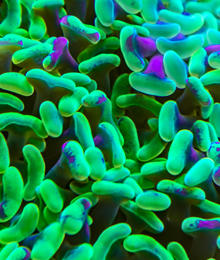An interview with Dr Evelien Adriaenssens
October 2020
Dr Evelien Adriaenssens is a Group Leader at the Quadram Institute, Norwich, UK, and a member of the Microbiology Society. In this interview, she tells us more about her research which focuses on investigating the effects of specific phage isolates on the healthy gut microbiome and looking at the interaction between AMR and phage resistance.

Tell us about your current role and area of research.
I am a Career Track Group Leader at the Quadram Institute Bioscience in Norwich. My group investigates the viruses present in the human gut and we are particularly focused on bacteriophages, viruses infecting bacteria. We are working both on the wet lab side, isolating new bacteriophages and looking into their function as part of the gut microbiome, as well as on the dry side, analysing large cohort datasets of gut microbiome (all gut micro-organisms and their DNA) and virome (all viruses and their DNA or RNA) data.
At the same time, I am heavily involved in virus taxonomy; i.e. the classification and naming of virus taxa, and I am Chair of the Bacterial and Archaeal Viruses Subcommittee of the International Committee on Taxonomy of Viruses.
Why is your research important?
In the last couple of years, everybody has been told that the microbiome, and particularly the gut microbiome, is important for healthy ageing. What most people usually don’t realise, is that viruses (including phages) are an integral part of the healthy microbiome. Recent evidence is showing that each individual is made up of different sets of core viruses, but we don’t yet know how these affect the diversity and function of our microbiome.
We are investigating the virome in infants as part of the institute’s PEARL study, defining the healthy infant gut virome, how it gets established and identifying key members of the community that can be used in new therapies to promote health. Interventions in early life are particularly important, as they can have long-lasting effects along the course of life.
Phages have gotten more popular in recent years with a couple of high-profile stories around the globe where people have been given a specific mixture of phages called a phage cocktail to treat antibiotic-resistant bacterial infections. The concept of phage therapy has been around for about 100 years, but its revival is mainly due to the increase in antimicrobial resistance (AMR) of bacterial pathogens. We’re currently investigating the effects of specific phage isolates on the healthy gut microbiome and looking at the interaction between AMR and phage resistance.
What are the challenges you face in your work and how do you try to overcome them?
There’s a multitude of challenges in modern research, some are organisational, and some are scientific. What I’ve struggled with most in the last couple of years are the short-term contracts. It is hard to get settled somewhere and build a body of research when you have to apply for new positions/fellowships and have to move every couple of years. As a result, sometimes my side projects spiral out of control and become my main areas of research for a while, because they are the only scientific stability in my life. Luckily, I now have a tenure-track appointment, meaning I have five years instead of two to really focus on my core science.
How did I overcome this challenge? I guess it’s a combination of perseverance and luck. I was building a name and expertise in the area of bacteriophages and viromics, applying for Fellowships to make the jump to independence. When I came across a position as group leader at the Quadram Institute Bioscience, they were specifically looking for someone with expertise in virome analysis and were interested in phage research. It was a great match, so that’s where I am now.
Why is it important to be a member of an organisation like the Microbiology Society?
I’ve only been in the UK since 2016, and I didn’t have a big network of people here. The Microbiology Society, and specifically the Annual Conference, have really helped me to get into contact with other local microbiologists and get a feel of what type of research is going on in the country.
Why does microbiology matter?
One only has to look at the news to know why microbiology matters with the current outbreak of COVID-19/SARS-CoV-2. But microbiology is much more than just pathogens, and this is a notion that is finally gaining traction. Microbes are everywhere, they make the oxygen we breathe, they help us digest food we otherwise wouldn’t be able to and they can make us sick. Knowing that, why wouldn’t you want to study microbiology?


